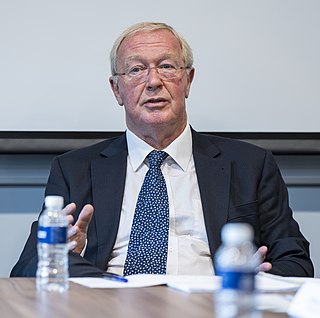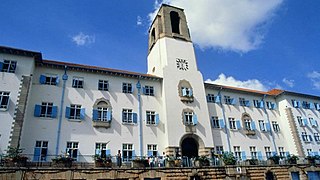
Louise Arbour, is a Canadian lawyer, prosecutor and jurist. She is currently the Special Representative of the United Nations Secretary-General for International Migration.
A trial which is observed by trial judge without being partial is a fair trial. Various rights associated with a fair trial are explicitly proclaimed in Article 10 of the Universal Declaration of Human Rights, the Sixth Amendment to the United States Constitution, and Article 6 of the European Convention of Human Rights, as well as numerous other constitutions and declarations throughout the world. There is no binding international law that defines what is not a fair trial; for example, the right to a jury trial and other important procedures vary from nation to nation.

The Judiciary of Portugal is a system of courts that together constitute one of the four organs of Sovereignty as defined by the Portuguese Constitution. The courts are independent from the other three Portuguese organs of Sovereignty.
Kellelo Justina Mafoso-Guni is a former justice of the African Court on Human and Peoples' Rights and the High Court of Lesotho, where she was the first woman on the Court.

The Supreme Court is the highest court in the Kingdom of Spain. Originally established pursuant to Title V of the Constitution of 1812 and currently regulated by Title VI of the Constitution of 1978, it has original jurisdiction over cases against high-ranking officials of the Kingdom and over cases regarding illegalization of political parties. It also has ultimate appellate jurisdiction over all cases. The Court has the power of judicial review, although due to the existence of a Constitutional Court, this power is limited to norms with lower rank than the law and only to norms passed by nation-wide administrations.
Daniel David Ntanda Nsereko is a member of the Advisory Committee on nominations of judges of the International Criminal Court and was a Judge of the International Criminal Court from Uganda.

The judiciary of Malta interprets and applies the laws of Malta, to ensure equal justice under law, and to provide a mechanism for dispute resolution. The legal system of is based partially on English law and partly on Continental law, whilst also being subject to European Union law. The judiciary is defined by the Constitution of Malta as a hierarchical system of courts, with a Constitutional Court, separate Civil and Criminal Courts of original jurisdiction. In the criminal court, typically the presiding judge sits with a jury of nine. The Court of Appeal and the Court of Criminal Appeal hear appeals from decisions of the civil and criminal cases delivered by the superior and inferior courts respectively. Inferior courts are presided over by Magistrates with original jurisdiction in criminal and civil actions.
Esther Mayambala Kisaakye is a Ugandan judge. She is a Justice of the Supreme Court of Uganda. She was appointed to that position in July 2009.

United Nations Security Council Resolution 1932, adopted unanimously on June 29, 2010, after recalling resolutions 955 (1995), 1165 (1998), 1329 (2000), 1411 (2002), 1431 (2002), 1717 (2006), 1824 (2008), 1855 (2008), 1878 (2008) and 1901 (2009) on Rwanda, the Council noted that the 2010 target for the completion of trials at the International Criminal Tribunal for Rwanda (ICTR) could not be met, and therefore extended the terms of 16 judges at the ICTR.

Sir Howard Andrew Clive Morrison, is a British lawyer and, since 2011, a Judge of the International Criminal Court based in The Hague, Netherlands.

United Nations Security Council Resolution 1705, adopted unanimously on August 29, 2006, after noting a letter from the President of the Security Council, the Council extended the term of Judge Solomy Balungi Bossa at the International Criminal Tribunal for Rwanda (ICTR).

Flavia Lattanzi is an Italian lawyer specialized in international law who is ad litem judge at the International Criminal Tribunal for the former Yugoslavia (ICTY) since 2007 and professor at the Roma Tre University. Between 2003 and 2007, she served as ad litem judge at the International Criminal Tribunal for Rwanda.
Bongani Christopher Majola is an advocate of the High Court of South Africa, an academic, human rights scholar, and the previous Assistant Secretary-General of the United Nations (UN) International Criminal Tribunal for Rwanda (ICTR). He currently serves as the chairperson of the South African Human Rights Commission.
Jane Mathews is a former judge of the Supreme Court of New South Wales, a former judge of the Federal Court of Australia and former President of the Administrative Appeals Tribunal.
Catherine Bamugemereire is a Ugandan lawyer and judge who, since 2015, has served as a Justice of the Court of Appeal of Uganda, which doubles as Uganda's Constitutional Court.
Solome Balungi Bossa, also, , is a Ugandan judge on the International Criminal Court (ICC). Immediately prior to her election to the ICC, she was a member of the Court of Appeal of Uganda, which also doubles as the Constitutional Court, in the Judiciary of Uganda. She was elected to her current position on 5 December 2017. She was sworn in on the court on Friday 9 March 2018.

The Court of Appeal of Uganda is the second-highest judicial organ in Uganda. It derives its powers from Article 134 of the 1995 Constitution. It is an appellate court when hearing cases appealed from the High Court of Uganda. However, it has original jurisdiction when adjudicating matters relating to the constitutionality of matters before it. All judgments by the Court of Appeal are theoretically appealable to the Supreme Court of Uganda, if the Supreme Court decides to hear the appeal.
Florence Rita Arrey is a Cameroonian judge who was the first female Chief Justice of the Court of the Appeal. She has served on the Supreme Court of Cameroon, and is a Vice President of the International Criminal Tribunal for Rwanda. In 2014, she was appointed Director of Judicial Professions in the Cameroonian Ministry of Justice.

Lydia Mugambe, is a Ugandan lawyer and judge at the High Court of Uganda. She was appointed to that court by president Yoweri Museveni, on 3 May 2013.














